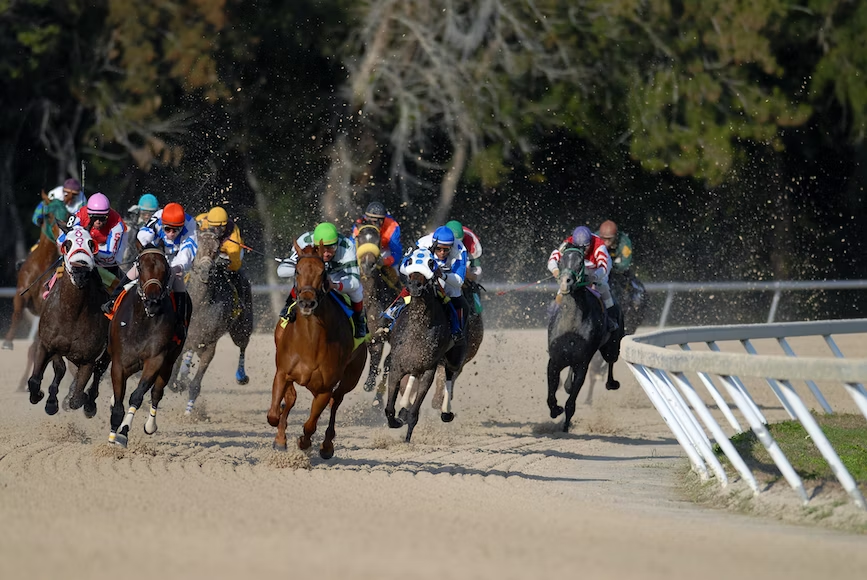The Thrilling Journey of Horse Racing and the Evolution of Gaming
Since ancient times, humans have sought entertainment in various forms. From the adrenaline rush of witnessing swift equines gallop in historical horse racing events to the modern-day excitement of placing bets at a live casino Canada and the rest of the world have evolved their modes of recreation. Just as a live casino in Canada offers an immersive experience capturing the essence of traditional gambling, horse racing, with its rich history, provides a timeless allure that transcends eras. This article traces the intriguing journey of horse racing, emphasizing its influence and significance throughout history.
Ancient Beginnings
The genesis of horse racing can be traced back over two millennia. Archaeological records from ancient civilizations like Egypt, Greece, and Babylon reveal the existence of horse and chariot racing. The Greeks integrated horse racing into the Olympic Games around 648 BCE, establishing its prestige as a sport.
Middle Ages to the Renaissance
With the fall of the Roman Empire and the onset of the Middle Ages, the emphasis shifted from chariot to mounted horse racing. The nobility largely owned horses, making the sport a symbol of status and power. By the time the Renaissance period rolled around, horse racing had grown in prominence, especially in Italy and subsequently in the rest of Europe.
The English Influence
England played a pivotal role in shaping modern horse racing. By the 12th century, English knights returned from the Crusades with Arab horses, renowned for their stamina and speed. Breeding these with English horses led to the emergence of the Thoroughbred, the premier racehorse breed.
During the reign of Charles II in the 17th century, horse racing flourished. The king’s passion for the sport led to the establishment of organized races, and Newmarket was declared the headquarters of English racing. The Jockey Club, formed in 1750, codified racing rules and demarcated the flat-racing season.
Colonial Expansion and Global Growth
As the British Empire expanded, so did its cultural imprints. Horse racing was introduced to the Americas, Australia, and parts of Asia. In the U.S., the first racetrack was laid out on Long Island in 1665. The American Stud Book, initiated in 1868, declared the guidelines for Thoroughbred racing, while the iconic Kentucky Derby commenced in 1875.
Australia witnessed its first official race in 1810 in Sydney, which laid the foundation for the country’s vibrant racing culture. The Melbourne Cup, initiated in 1861, remains a significant event on the global horse racing calendar.
In Asia, the British introduced horse racing in India and Hong Kong, where it remains a popular sport. Japan, too, embraced horse racing in the late 19th century, adapting it to its unique culture and today boasts some of the world’s richest racing events.
Modern Evolution and Cultural Impact
The 20th and 21st centuries have witnessed technological advancements that revolutionized horse racing. From photo finishes to ensure accurate results to broadcasting races on television and online platforms, the sport remains accessible to enthusiasts worldwide.
Furthermore, the Triple Crown series in the U.S., comprising the Kentucky Derby, Preakness Stakes, and Belmont Stakes, has elevated the sport’s prestige. In the UK, events like The Grand National and The Royal Ascot are not just racing events but significant social gatherings.
Betting, an intrinsic part of horse racing, has also evolved. From on-track bookmakers to sophisticated online platforms that allow wagering on races from around the world, the thrill of predicting a winner remains unchanged. This essence of anticipation and risk mirrors the experience at a live casino. Canada’s betting platforms, for instance, capture this very essence, bridging the gap between traditional betting forms and modern digital engagements.
Horse racing’s journey from ancient chariot races to the grandeur of today’s events highlights its enduring appeal and adaptability. Like the charm of engaging with a live dealer in a digital casino, the thrill of watching a horse race live, with its unpredictability and sheer power, remains unmatched. As long as the heart yearns for excitement and entertainment, horse racing, much like the ever-evolving realm of gambling, will continue to thrive and captivate imaginations worldwide.
 The 2023 Travers Stakes is another horse racing event that fans, experts, and bettors look forward to. This race takes place every August of the year. As we enter the month, Travers Stakes fans are at the edge of their seats as they wait for updates, news, and predictions about the upcoming race.
The 2023 Travers Stakes is another horse racing event that fans, experts, and bettors look forward to. This race takes place every August of the year. As we enter the month, Travers Stakes fans are at the edge of their seats as they wait for updates, news, and predictions about the upcoming race. One of the world’s most prominent horse racing competitions, the Royal Ascot draws elite racehorses, renowned jockeys and avid fans who search for the best royal ascot odds online. The desire to wager on the races increases as anticipation for this yearly event rises. This thorough guide will give you the necessary knowledge and advice to improve your betting experience if you plan to wager on the Royal Ascot race.
One of the world’s most prominent horse racing competitions, the Royal Ascot draws elite racehorses, renowned jockeys and avid fans who search for the best royal ascot odds online. The desire to wager on the races increases as anticipation for this yearly event rises. This thorough guide will give you the necessary knowledge and advice to improve your betting experience if you plan to wager on the Royal Ascot race.